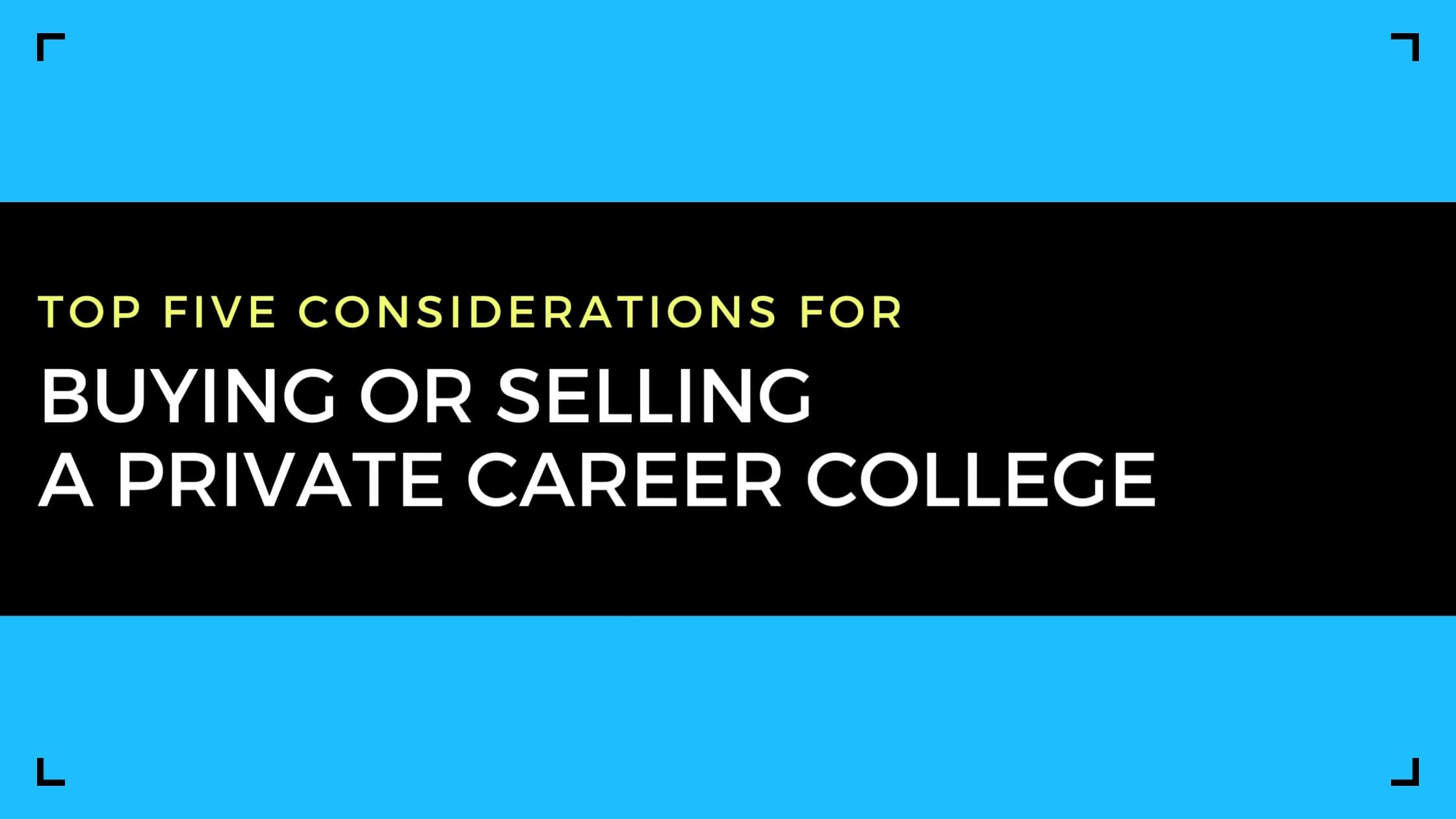In two decades of practice devoted exclusively to the legal needs of private post-secondary institutions, I can’t remember a more exciting time to be involved in the sector.
Over the years, I have advised many buyers and sellers of private career colleges, but I expect the number to grow in the near future, thanks to a significant upswing in the intensity of transactional activity – fueled by a wave of newcomers to the industry, but also newcomers to Canada.
If you are considering purchasing or selling a private career college, here are five things you should know before sealing the deal. My caveat: I am not an investment banker, and this article is authored from a regulatory perspective. I am not qualified to provide investment banking advice, nor is that my role on these transactions.
1. Valuations are on fire
The business case for private post-secondary institutions has always been a compelling one, but a longstanding labour shortage combined with our swiftly aging population has enhanced their attractiveness even further.
Meanwhile, with Canada expecting to welcome 500,000 new entrants or more annually, immigration seems to be at the heart of the plan to boost our dwindling tax base and provide the next generation of personal support workers, truck drivers, pilots, dental hygienists, paramedics, and other allied health professionals. Private career colleges will play a key role in the country’s shifting labour market demands.
In the last four or five years, investors — including large institutional and strategic players — have woken up to this potential and begun flocking into the space. At least that’s what I am seeing in my practice.
The result is that the market is heating up and valuations seem to be soaring, with even the most ensconced private college owners forced to reconsider their positions after receiving offers they had previously thought inconceivable.
2. Expect regulatory scrutiny
A private post-secondary institution is no ordinary business. The level of governmental oversight in the sector is unlike almost any other in the country — even when compared to the regime in place for private secondary schools. Ironic that the private schools you may send your teens into — are barely regulated, by comparison!
As a result, executing a deal in the space is much more of a regulatory affair than a corporate transaction in an unregulated sector, since every transaction is carried out under the watchful eyes of government authorities. The purchase agreements on these transactions typically range from 50 pages to over 300 pages. While most of the agreement is devoted to the terms of the commercial deal itself and the government does not care about whether such transactions are commercially improvident for one side or another, it does care about any provision that could adversely impact students. In short, and to inject some humour to this discussion, it does not care if you sell your school for some McNuggets! But it does care whether your post-closing lease is intact or whether your qualified instructors will remain in place, post-closing (all instructors in registered approved programs must have Instructor Qualification Forms behind them).
The members of our team are no strangers to deals of this type, and we only work with corporate, real estate, and employment lawyers, who grasp the nuances of this special brand of M&A. The writer proudly and routinely advises some of Canada’s most notable law firms on these issues, too.
3. Industry knowledge is key
Regulatory reviews run much deeper than a simple background check. In the past, provincial ministries may have paid less attention to changes in the ownership of private post-secondary institutions, but the passage of Ontario’s Private Career Colleges Act, 2005, which came into force on September 18, 2006 marked a turning point, and authorities in Ontario will no longer let just anyone take charge. Most of the other provinces, and most notably British Columbia, have similar legislation to Ontario’s. It is consumer protection legislation at its core.
These days, financial wherewithal, solid reference checks and a clean criminal record are the baseline for deal approval by the regulator. In addition, provincial regulators want to be satisfied that the new operating team has some sector-specific knowledge and pedagogical grounding that signals they will be suitable stewards for the college well into the future.
4. Beware the quick flip
While it is undeniable that the private career college market is red-hot at the moment, investors should think twice about getting involved in the sector if their primary focus is making a quick profit.
While a real estate investor may be able to extract significant value from an underpriced piece of land by fixing it up and selling it in short order, a private career college is not that kind of asset in my view.
By contrast, the driving factor behind a private college’s value is its student learning outcomes, in part measured by “objective” Key Performance Indicators (KPI’s) but also based on the subjective satisfaction of the students who will form the school’s alumni. This happens over years. Owners who lose sight of that fact are liable to run into trouble from regulators on the lookout for passive and short-term investors who appear uncommitted to the sector.
5. Funding options abound
Once prospective buyers have lined up the right management and legal team for their bid, there are plenty of funding options, with Business Development Canada offering significant backing for many private college deals.
When it comes to students, a host of government grants beyond the Ontario Student Assistance Program (for schools that qualify for OSAP) – are available to fund tuition for students eager to address labour market shortages in certain areas. In the private sector, too, many large businesses are offering incentives and subsidies for students to complete programs in trucking, aviation, Information Technology, medical fields, and other trades.
Look forward to your comments, criticisms, and feedback! Thanks for reading.
